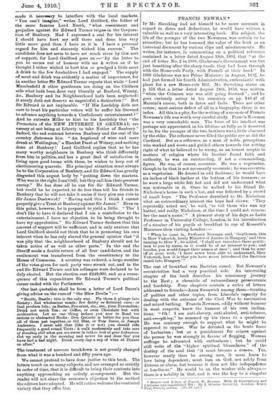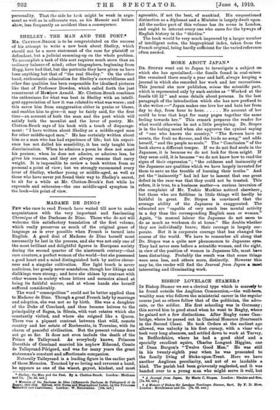FRANCIS NEWMAN.* IF Mr. Sieveking had set himself to be
more accurate in regard to dates and deductions, he would have written a valuable as well as a very interesting book. His subject, the life of the younger of the two Newmans, was certain to be attractive; but he has lessened the value of the book as an historical document by curious slips and misstatements. He writes, for instance, in commenting on a political reference contained in a letter dated August 19th, 1892, that " at the end of letter No. 2 in 1888, Gladstone's Government was but just breathing after the sharp tussle they bad been through with the Home-rule Party, with Parnell at their head." In 1888 Gladstone was not Prime Minister ; in August, 1832, he had just formed his fourth Administration, enthusiastic with plans for a new Home-rule Bill. Mr. Sieveking states on p. 153 that a letter dated August 24th, 1856, was written " when the Crimean war was still going forward ; and he goes curiously astray in his summary on pp. 146-47 of Mazzini's career, both in dates and facts. There are other errors ; most serious defect of all in a biography, there is no index. All this is a pity, for the writing of a memoir of Francis Newman's life was worth very careful study. Francis Newman was a very remarkable man. The force of his intellect was perhaps not appreciated in his lifetime as fully as it deserved to be, for the younger of the two brothers was a little obscured by the elder. The reformer never filled the public eye as did the Cardinal. But as a reformer, as a man of noble perceptions who worked and wrote and guided others towards the setting right of what he believed to be wrong, as an honest sceptic in matters of religion where his brother found faith and authority, he was an outstanding, if not a commanding, figure. He was, of course, eccentric. He was a vegetarian, though to be that is not necessarily eccentric ; he was eccentric as a vegetarian. He dressed in odd fashions ; Le would have six inches of black leather at the bottom of his trousers ; or he wore a large white felt hat and did not understand what was noticeable in it. Once he walked to his friend Dr. Nicholson's house in such a hat, and was followed by a crowd of small boys. " The Professor described to Dr. Nicholson what an extraordinary interest the boys had shown. They repeatedly asked me,' he said, 'to tell them who was my hatter, and really, Nicholson, at the time I could not remem-
ber the man's name." A pleasant story of his days as Latin Professor in University College, London, is his introduction of a number of his pupils at breakfast to one of Kossuth's Ministers then visiting London:— "When he came in, Professor Newman said, Gentlemen, this is Herr Vukovich, lately Minister of Justice in Hungary,' and then turning to Herr V., he added, shall not introduce these gentle- men to you by name, as it would be of no interest to you; and besides, you would forget their names at once' - and than he went off at score with, I have never been able to understand, Herr Vukovich, how it is that you have never introduced the Bactrian camel into Hungary.'"
The rest of breakfast was Bactrian camel. But Newman's eccentricities had a very practical side. An interesting chapter of the book describes his missionary journey to the East ; a chronicle of extraordinary perseverance and hardship. Four chapters contain a series of letters addressed to friends—Anna Swanwick among them—treating of politics and other topics, from Lincoln's capacity for dealing with the outcome of the Civil War to vaccination and mixed bathing. Francis Newman, oddly without humour in most respects, knew the humour of his own inclina- tions. " Oh ! I am anti-slavery, anti-alcohol, anti-tobacco,
anti-everything," he summed up his views to a questioner. He was contrary enough to support what he might be expected to oppose. War he detested as the brute force of barbarism ; but as a punishment for crimes against the person he was strongly in favour of flogging. Woman suffrage he advocated with enthusiasm ; but he could still write of the "higher spiritual blessedness " of the destiny of the soul that "it must become a woman. Yes, however manly thou be among men, it must learn to love being dependent; must lean on God, not solely from distress or alarm, but because it does not like independence or loneliness." He would he on the weaker side always,—
there is a nobility in that, and it was the key to a singular
• Memoir and Letters of Francis W. Newman. With 28 Illustrations and 2 Articles (one unpublished MS.) Ely I. Giberne Sierekin3'. London: Keg= Tau!, Trench, and Co. [103. 6d. net.]
personality. That the side he took might be weak in argu- ment as well as in adherents was, as his Memoir and letters show, less frequently an accident than a consequence.



















































 Previous page
Previous page